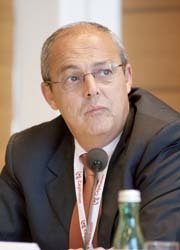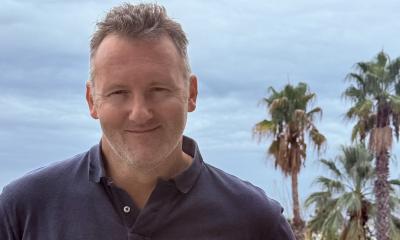The 11th EAPC Congress
Faced with death, what are the wishes of terminally ill patients? Does a request for euthanasia disappear with good palliative care? How invasive should medicine be at this final stage of life? Is comprehensive palliative care financially affordable? Can studies on those who are dying be ethically justified? Difficult questions, but all posed during the 11th European Association of Palliative Care (EAPC) Congress. Held in May, the event drew 2,500 international participants. H C Pruszinsky reports

Professor Franco de Conno, Honorary Director of the EAPC, National Cancer Institute Milan, and pioneer of European palliative care, warned of the dangers of legalisation of euthanasia in further European countries, pointing out the danger that defenceless, critically ill people are being pressurised, or that money due to be spent on the expansion of palliative structures is being axed. ‘We are aiming for a special additional training programme for all occupational groups involved in palliative care in all European countries, and particularly for specialisation among doctors. Individual countries have progressed at different paces in this area. Most people who work in palliative care do not want anything whatsoever to do with euthanasia – apart from the fact that in the majority of countries it remains illegal.’ There are, he added, different approaches to the subject of euthanasia and assisted suicide, and it is important to have an open, active discussion on this topic.
Confusion over ‘terminal’ or palliative sedation with euthanasia is typical. They are two completely different concepts. ‘Palliative sedation aims to ease intolerable levels of suffering through the help of highly sedative medication, but there is no intent to end patients’ lives,’ he explained.
Some patients are scared of the capabilities of modern medicine and worry that their lives may be unnecessarily prolonged, or that they may end up suffering intolerably, and so the possibility of euthanasia or medically assisted suicide may appear to be a way out. ‘The Ethic Task Force of the EAPC therefore advocates a direct and open dialogue with the supporters of euthanasia and medically assisted suicide,’ he pointed out.
Research
Among several reasons why research on palliative care has not as advanced as in other medical areas, is that palliative care traditionally developed away from the university environment, explained Professor Stein Kaasa, research co-ordinator of the EAPC (Norway). ‘The performance of studies with critically ill and dying patients obviously raises difficult ethical questions, which is why there is traditionally a lot of scepticism towards research amongst those working in palliative care and in the hospice movement.’
EU funding secured
Palliative research is catching up remarkably on a European level, due to a range of activities. One important contribution was made by the EAPC Research Network. With the European Palliative Care Research Collaborative (EPCRC), the first, large-scale palliative research project has begun. ‘There are 11 centres in Great Britain, Italy, Switzerland, Germany, Austria and Norway, and the project is co-ordinated by the Norwegian University for Science and Technology in Trondheim, and we have secured EU funding of 2.8 million euros over a three-year period,’ Prof Kaasa said.
The main topics of this project are to identify genes and genetic changes that are responsible for very different reactions in individual patients to opioid treatments, as well as genetic changes that increase the risk of cachexia. The term covers a number of symptoms characterised by significant debility that frequently occurs in palliative patients.
Another aim is to improve pain measurement, with computer assistance.
Based on such standardised classification, the development of evidence-based guidelines for the capture and treatment of pain, depression and cachexia is envisaged.
The fourth aim will be to ensure co-operation beyond the period of EU funding, by developing lasting oncological palliative research co-operation across Europe.
Loss of dignity: the biggest impact on the terminally ill
General debility and loss of dignity are the main reasons why terminally ill patients would like all life-preserving procedures stopped, according to a Dutch study presented at the congress. Swiss experts said not enough is known about the motives for the desire to carry out assisted suicide. A study is set to deliver palliative care tips for better strategies against acts of desperation and capitulation.
The Dutch researchers worked nationally with doctors who completed forms for cancer patients in the end of life stages, with a life expectancy of no more than three months. They evaluated data from 85 patients. Results: The closer the patients were to an expected end of their lives, the more the questions increased about the possibility of stopping life-preserving treatment. This was closely related to symptoms that considerably strained them – particularly general debility. The loss of dignity and severe physical symptoms combined with psycho-social problems were the most common causes for the terminally ill to enquire about the possibility of euthanasia. But it is exactly these motives that need to be more closely examined so that affected patients can be offered the best possible care, the study’s authors Professor J-J Georges (Hoogschool Utrecht) and colleagues emphasised.
In Switzerland around 200 – 250 people annually contact organisations that ‘arrange’ assisted suicide which, with under certain conditions, is legal there. However, according to care expert Alexandra Bernhart-Just of the Centre for Care Research at Zurich University Hospital, the motives for such decisions made by patients have still not been sufficiently researched. For planning optimum palliative care this is a real problem: they are the very people at whom specialised care is aimed, so that such acts of desperation and capitulation do not arise.
‘From a medical point of view the question of euthanasia is often a – sometimes desperate – call for help,’ pointed out congress president Professor Hans-Georg Kress (AKH Vienna, Medical University Vienna). ‘Critically ill patients are often trying to tell us in this way that they are suffering because of their physical symptoms, the loss of independence or that they can no longer cope with the illness-related life changes. Comprehensive palliative medical care through an experienced, multi-professional team can alleviate many of these problems and redress the need for euthanasia.’ For others, who subjectively experience serious suffering, the offer of palliative sedation, i.e. a reduction in their degree of alertness and level of consciousness right down to permanent sleeping through the repeated administration of sedating medication may be an acceptable solution.
www.european-hospital.com presents an extended online EAPC report
01.07.2009




